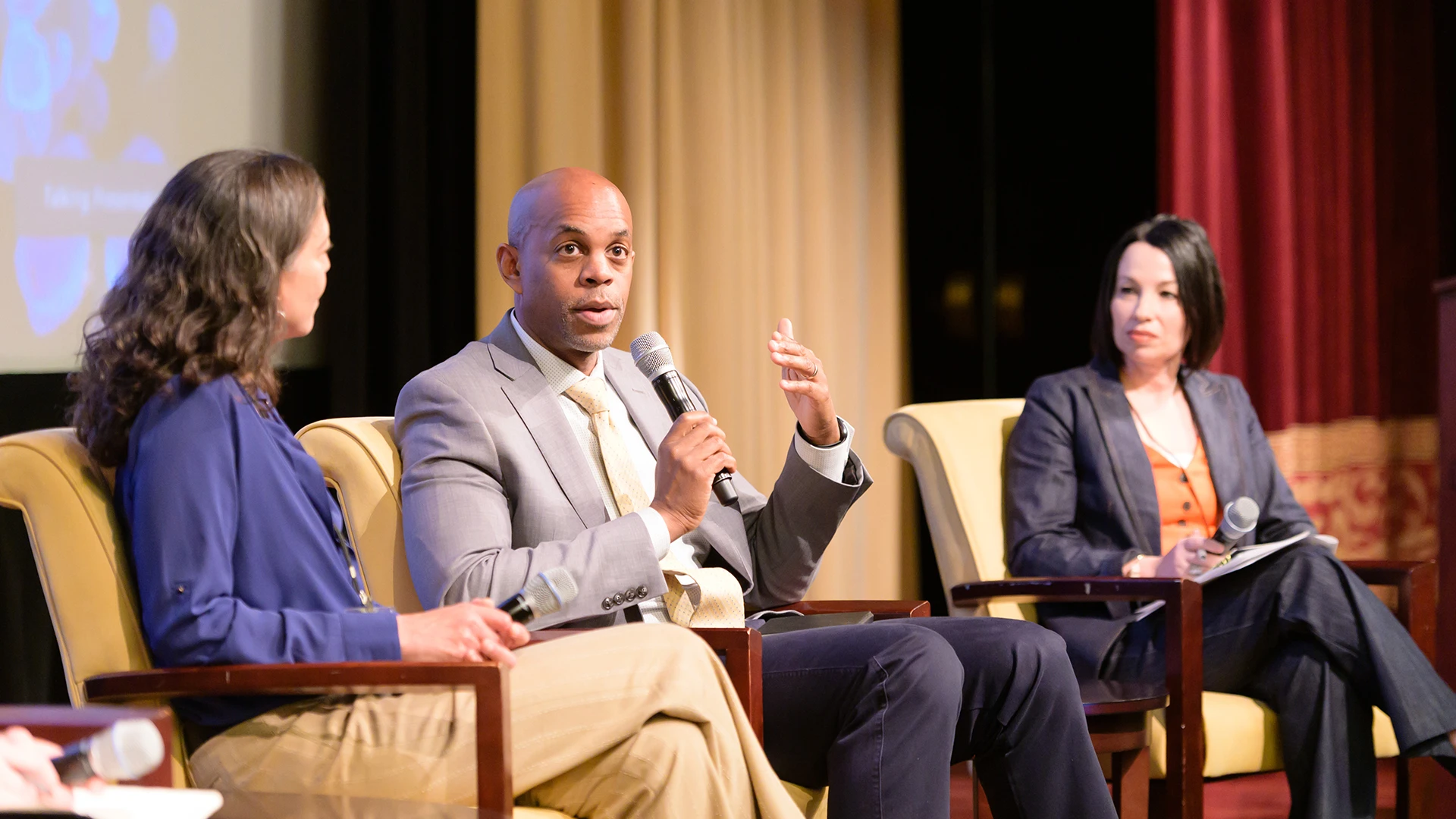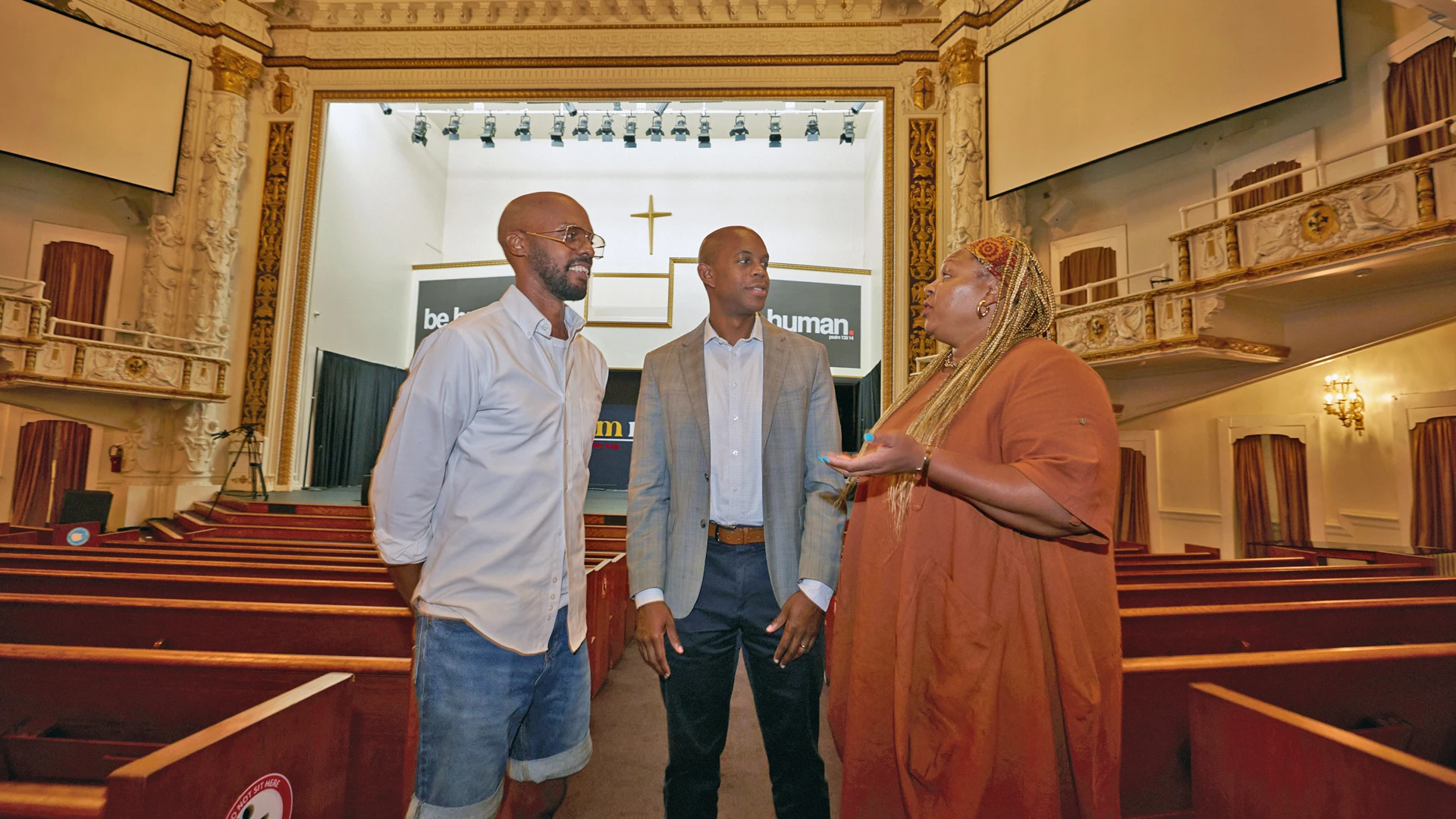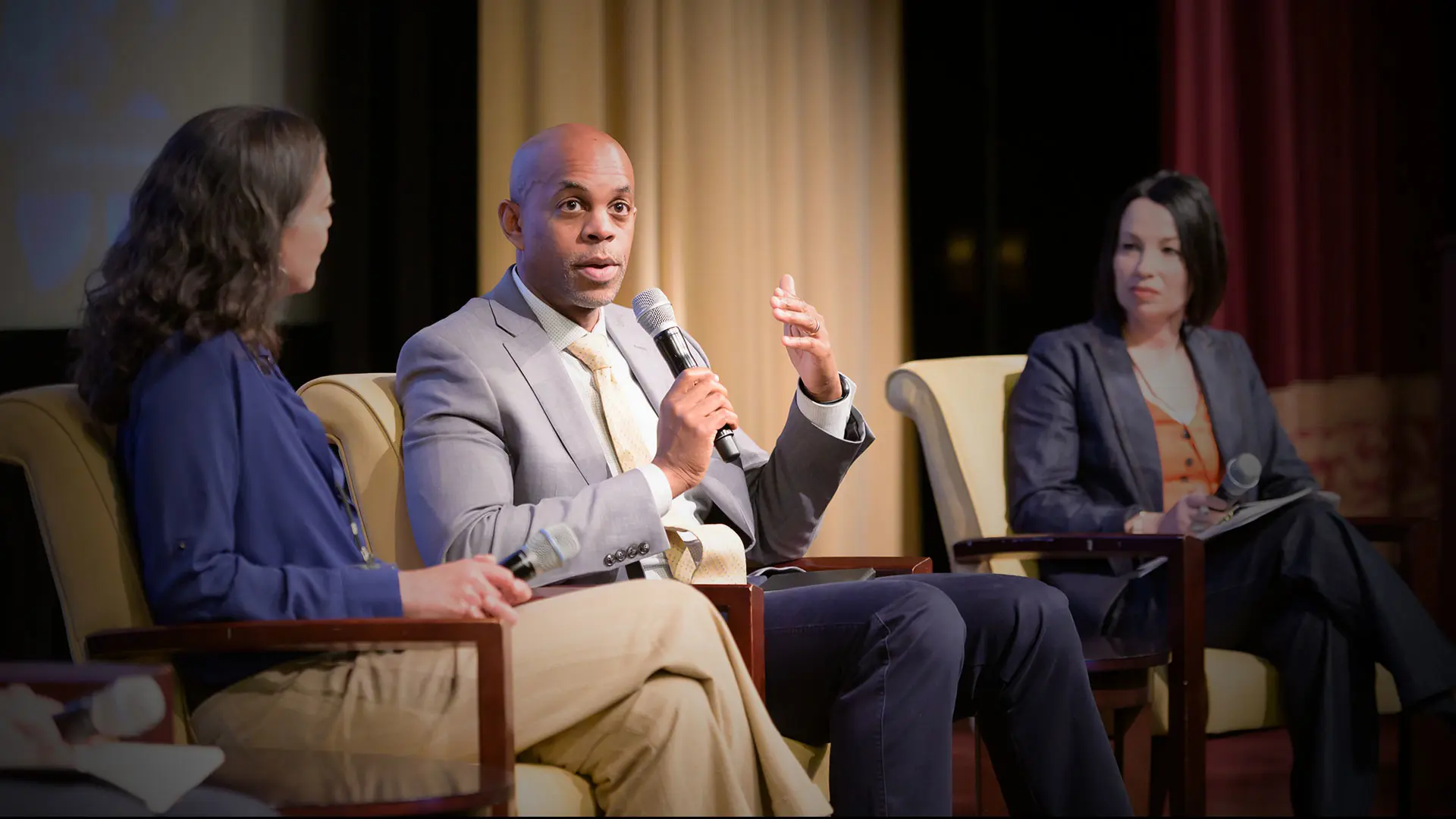His efforts have not gone unnoticed. In March, he was invited to speak at a National Institute of Mental Health (NIMH) 75th anniversary symposium for his innovative research on the role of faith-based mental health services to address mental health disparities. His lecture showcased how coordinated outreach to churches and community organizations has provided fresh perspectives about the needs of this long-ignored population and access to psychiatric care programs. Dr. Hankerson is Associate Professor and Vice Chair, Department of Psychiatry, and Director of Mental Health Equity Research for the Institute for Health Equity Research at the Icahn School of Medicine at Mount Sinai.

Sidney Hankerson, MD, MBA, at the National Institute for Mental Health 75th anniversary symposium.
“Leveraging principles of community-partnered participatory research is a highly promising approach to promote mental health equity—the idea that everyone should have access to the resources they need to lead healthy lives,” Dr. Hankerson told the NIMH audience of public health officers and mental health researchers. “A study from the National Comorbidity Survey Replication shows that more people in this country initially seek mental health care from clergy than from psychiatrists, which underscores the point that rigorous science can and should be conducted with significant community input. It’s an integral part of what we’re doing as community-engaged scientists to rewrite the story of NIMH-funded research.”
“More people in this country initially seek mental health care from clergy than from psychiatrists, which underscores the point that rigorous science can and should be conducted with significant community input.”
— Sidney Hankerson, MD, MBA
No partner better typifies Dr. Hankerson’s evidence-based approach than the historic First Corinthian Baptist Church in Harlem, New York, and its widely respected pastor, Michael Walrond Jr., MDiv. Pastor Walrond invited Dr. Hankerson to work with his congregation to grow its seven-year-old mental health program known as the HOPE (Healing On Purpose and Evolving) Center. Under the leadership of Executive Director Lena L. Green, DSW, LCSW, the HOPE Center provides access to 12 psychotherapy sessions free of charge to individuals, as well as group therapy sessions aimed at such diverse demographics as the LGBTQ+ community and pregnant mothers. Mount Sinai and a host of foundations and organizations support the HOPE Clinic, which treats growing numbers of individuals seeking help for anxiety, substance use, loneliness, grief, and personal loss.
Additional efforts include an American Psychiatric Association community diversity fellowship position for PGY-4 Mount Sinai Psychiatry resident Tina Kim, MD, to provide clinical services at the HOPE Center. Support for these Psychiatry residents—Dr. Kim and Storm Portner, MD—comes from a grant from the Mother Cabrini Health Foundation.

Sidney Hankerson, MD, MBA (center), with Deacon Darnell McLaurin, a certified mental health coach (left), and Lena L. Green, DSW, LCSW (right), at First Corinthian Baptist Church.
We’re facing a mental health crisis in communities of color that has its historical roots in the distrust its members have for research.
The crisis is linked to structural barriers community members face in accessing culturally sensitive care, coupled with prohibitive costs and a legacy of poor outcomes.
As co-primary investigator of a National Institute of Mental Health-funded study known as TRIUMPH (R01 MH121590), Dr. Hankerson and his Mount Sinai team, along with the Columbia University Center for Community Health, have screened more than 1,200 adults for depression and anxiety over the past three years by partnering with 22 churches in New York City.
1,200+ adults have been screened for depression and anxiety over the past three years ...
... by partnering with 22 churches in New York City.
“We’re facing a mental health crisis in communities of color that has its historical roots in the distrust its members have for research,” said Dr. Hankerson. “The reason for that is the many barriers they’ve faced in accessing culturally sensitive care, coupled with prohibitive costs and a legacy of poor outcomes. My team’s work is focused on removing those barriers by forming community-based networks of care in places where people congregate and can readily access preventive and therapeutic interventions for mental health problems from experts in the field.”
The TRIUMPH study, which Dr. Hankerson leads with Olajide Williams, MD, MS, of Columbia University, is additionally collaborating with churches to identify individuals struggling with depression, stress, and other mental health issues, connecting them to community health workers whom the program has specially trained and certified to screen and refer them to appropriate resources, which include Mount Sinai’s psychiatric services.
As part of his dogged community outreach in light of the aforementioned mental health inequities, Dr. Hankerson is about to implement another intervention aimed at youth, particularly those at risk of suicide, by engaging churches as well as Boys & Girls Clubs and YMCA/YWCA basketball leagues. Known as HAVEN-Connect and Brothers Connect, the initiative is a partnership with Sherry Molock, PhD (George Washington University); Peter Wyman, PhD (University of Rochester); and Jay Carruthers, MD (New York State Office of Mental Health), and is funded by grants from the American Foundation for Suicide Prevention and the Scarlet Feather Foundation.
“Our goal is to emphasize to youth the importance of social connectedness and some of the risk factors unique to them—including racial discrimination—and give them the tools to work with adults or their peers to get linked to preventive care if they need it,” explained Dr. Hankerson. “The rate of suicide among Black youth is at an all-time high, so it’s critical that we think outside the box for ways to actively engage at-risk youth for care, instead of waiting for them to come to us. By working with basketball leagues, Boys & Girls Clubs, and faith-based organizations, we hope to lay the foundation for regional and national dissemination.”
Dr. Hankerson challenged his audience to “identify your own role” in rewriting the story of NIMH-funded research.
Our goal is to turn the Mount Sinai Mental Health Equity Research program into ...
... the preeminent model for community-driven psychiatric practice and research.
Dr. Hankerson concluded his remarks by sharing, “Our goal is to turn the Mount Sinai Mental Health Equity Research program into a preeminent model for community-driven psychiatric practice and research by engaging community members as research participants, and helping our own investigators understand the importance of social determinants of health in delivering mental health interventions. Guiding us is the knowledge that this participatory strategy benefits not just underserved and marginalized communities, but the entire country.”
The following "Let's TRIUMPH Together" recruitment video is used to identify community members, 18 years or older, who might be experiencing stress, anxiety, grief from loss, or depression. Visit https://letstriumphtogether.com to learn more.
A research study known as "TRIUMPH" partners with churches throughout New York City to identify community members, 18 years or older, who might be experiencing stress, anxiety, grief from loss, or depression. To learn more, watch this video or visit www.letstriumphtogether.com.
